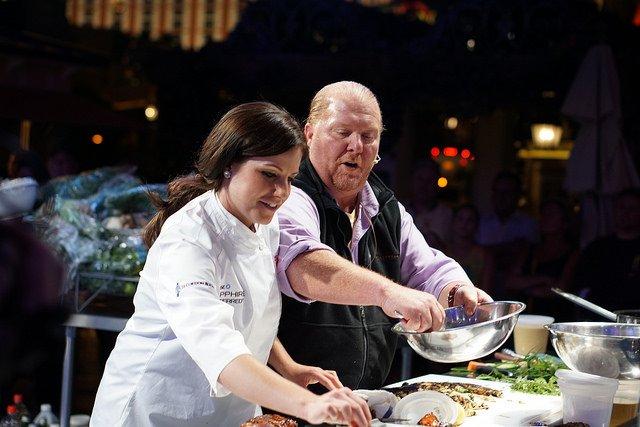
Estimates suggest up to 40 percent of food in the U.S. is wasted, whether that occurs at the farm, restaurant, supermarket or at home. And that waste reverberates beyond edible food that ends up in a trash bin — as in the water and energy consumed when growing and processing that food, only to be lost when it ends up being thrown out.
More companies and restaurants are trying to do more to solve the food waste problem, but there is plenty of room for improvement. An interesting collaboration between TV chef Mario Batali and brewer Sam Calagione, however, could help raise awareness.
Calagione, founder of Dogfish Head Brewery, will launch a six-episode Web series on creative ways to brew beer, "That’s Odd, Let’s Drink It," which premiers on Oct. 28. That first episode, featuring Batali, will pair the offbeat brewer and "Iron Chef" alum together in Chicago to create a brew for the popular high-end Italian restaurant and retailer Eataly. The ale will be fermented from overripe tomatoes, bruised fruit and other fruit not sold to consumers but perfectly usable for other purposes.
The episode is inspired in part by wastED, a group of restaurateurs, farmers, retailers and food companies seeking creative ways to cope with food waste. The concept that wastED is testing really is not new: Those kale stems can be used for vegetable stock, lemon rind for baking, and heck, even that cacao sitting in your cupboard and huge jar of mayo from Costco in your fridge would do better in a cake than in the dumpster. But this is far more serious than Carl Weathers on "Arrested Development" insisting that one save that rib bone because “baby you got a stew going.”
The entire value chain of the food-energy nexus is at fault when it comes to food waste, and all hands need to be on deck to solve this problem. Such cooperation was evident in New York, where individuals and organizations behind wastED saw their efforts coalesced in a Greenwich Village Restaurant, Blue Hill, which they transformed into a pop-up café in order to prove that what may be bruised or ugly can be turned into something delicious and irresistible.
And while the fantastic Netflix series "Orange is the New Black" has inspired DIY interest in how to make homemade hooch, brewers around the world have long used leftover food to make homemade brew. Long before beer was brewed directly from grains, bread had long been the main ingredient of this frothy treat. Now more beer artisans are taking this art to a new level.
Earlier this year, a Chicago pub caught attention for an extra bitter ale it made from food that otherwise would have been tossed out. Meanwhile, across the pond, in response to a report stating that 12 percent of the food wasted in Belgium is bread, a microbrewer worked with a local NGO to score unsold bread from local markets. Hence a 7 percent alcohol amber was born, much to the delight of Reuters.
With hunger an ongoing problem even here in the U.S., some may view these experiments as a flippant way to cope with a massive problem. But many of these restaurants and organizations finding a new way to make beer out of food scraps are also on the front lines of fighting hunger in their local communities. If the likes of Mario Batali can help raise awareness, then their funky tomato brew is time well invested.
Image credits: Flickr/l_sands

Leon Kaye has written for 3p since 2010 and become executive editor in 2018. His previous work includes writing for the Guardian as well as other online and print publications. In addition, he's worked in sales executive roles within technology and financial research companies, as well as for a public relations firm, for which he consulted with one of the globe’s leading sustainability initiatives. Currently living in Central California, he’s traveled to 70-plus countries and has lived and worked in South Korea, the United Arab Emirates and Uruguay.
Leon’s an alum of Fresno State, the University of Maryland, Baltimore County and the University of Southern California's Marshall Business School. He enjoys traveling abroad as well as exploring California’s Central Coast and the Sierra Nevadas.














